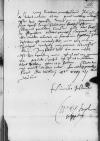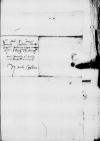List #723
Cornelis DE SCHEPPER do Ioannes DANTISCUSParis, 1531-12-06
| odebrano Brussels, [1531]-12-22 Rękopiśmienne podstawy źródłowe:
Pomocnicze podstawy źródłowe:
Publikacje:
| ||||||||||||||
Tekst + aparat krytyczny + komentarzZwykły tekstTekst + komentarzTekst + aparat krytyczny
Reverendissimo Domino, domino
In aula
Salutem plurimam.
Veni
Humilis inservitor


 AAWO, AB, D. 3, f. 116v
AAWO, AB, D. 3, f. 116v